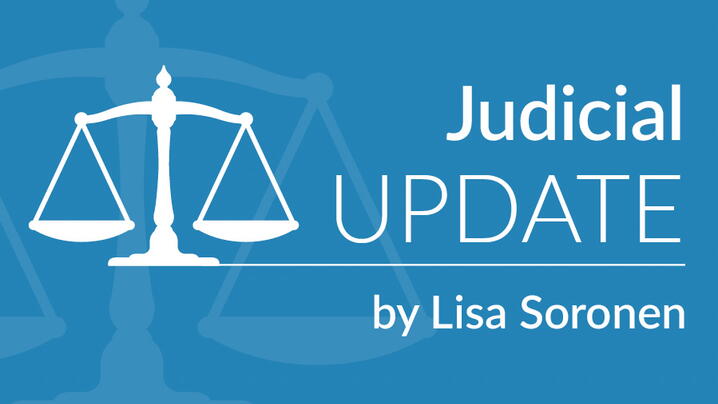
by Lisa Soronen, executive director, State and Local Legal Center
The Fifth Amendment’s Double Jeopardy Clause, which prohibits a person from being prosecuted more than once for the same conduct, is a familiar concept. Less familiar is the “separate sovereigns” exception that allows the states and the federal government to convict and sentence a person for the same conduct. In Gamble v. United States, Terance Gamble asks the Supreme Court to overrule this exception.
Gamble was prosecuted for and convicted of possession of a firearm by a convicted felon under both Alabama and United States law. His challenge to the “separate sovereigns” exception is unsurprising given that Justice Thomas joined Justice Ginsburg’s concurring opinion in Puerto Rico v. Sanchez-Valle (2016), suggesting the court do a “fresh examination” of the “separate sovereigns” exception. These justices are on opposite ends of the ideological spectrum and typically don’t vote together in close cases.
In Sanchez-Valle, the court held that the Double Jeopardy Clause bars both Puerto Rico and the United States from prosecuting a person for the same conduct under equivalent criminal laws. Puerto Rico isn’t a sovereign distinct from the United States because it derived its authority from the U.S. Congress.
According to Gamble, the separate-sovereigns exception “has its origins” in an 1847 Supreme Court case, and it “fully crystallized” in a pair of 1959 cases. Gamble argues it should be overruled because it “flunks every test of constitutional interpretation.”
More specifically, Gamble claims “[i]t has no basis in the text of the Fifth Amendment. It is inconsistent with the Clause’s original meaning, which derived from a long common law tradition that explicitly extended to prosecutions by separate sovereigns. It is irreconcilable with the Clause’s driving purpose, which is to ensure finality by protecting individuals from the threat or reality of successive prosecutions. And it distorts foundational precepts of federalism, pursuant to which our system of dual sovereignty is supposed to protect individual liberty rather than take it away.”
More practically, Gamble asserts the separate-sovereigns exception might have made sense when duplicative state and federal convictions were rare, but this is no longer the case. Gamble claims he faced duplicative prosecutions for a common offense.
The United States asked the Supreme Court not to agree to hear this case—though it decided to anyway. Among other arguments, the United States pointed out that “if a federal prosecution could bar prosecution by a State, the result would be significant interference with the States’ historical police powers.”
The United States also disputed whether there has been a significant increase in the rate of federal prosecutions in areas of overlap with state authority. It points to the Department of Justice’s policy of not authorizing a successive federal prosecution “unless it is justified by a substantial Federal interest that was ‘demonstrably unvindicated’ by the prior state prosecution.”
The states and the local governments that prosecute state crimes have an interest in being able to prosecute state crimes without worrying about whether and when the federal government might also bring charges for the same conduct.
Related Resources
Unions Lose Supreme Court Dues Case. This 2018 blog post looks at the Supreme Court's decision in a case involving public unions.
Local Government Officials Await Changes to Apparel Bans at Polling Places Following SCOTUS Decision. In another 2018 blog post, the focus is on a case involving political apparel in polling places.
Colorado Cake Maker Wins Same-Sex Marriage Cake Case in Narrow Opinion. This case from 2018 looks at public accommodations laws, with the court ruling that local governments must take religious objections seriously.
New, Reduced Membership Dues
A new, reduced dues rate is available for CAOs/ACAOs, along with additional discounts for those in smaller communities, has been implemented. Learn more and be sure to join or renew today!
